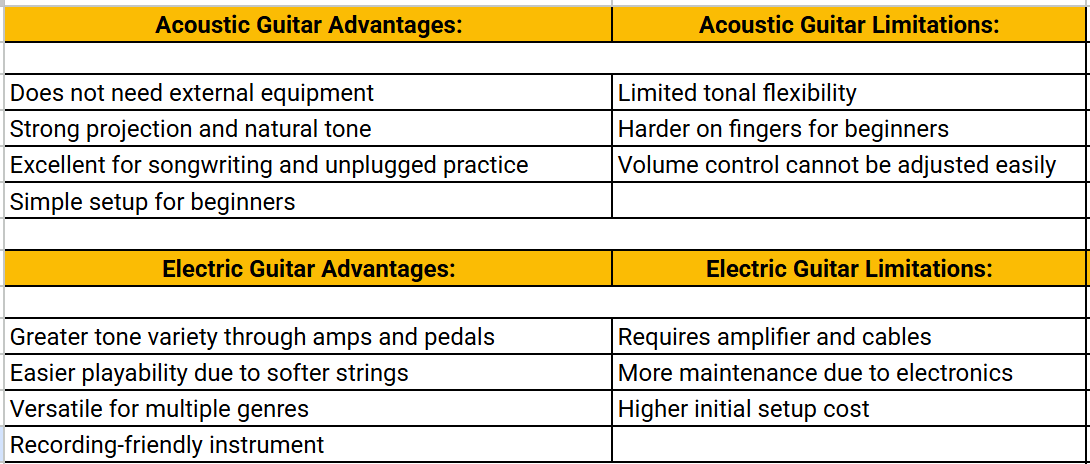
~Turja Das Gupta
SME, Guitar & Ukulele
Table of Contents
So you're ready to start your guitar journey? That's awesome! But here comes the big question: Should you go with an acoustic or an electric guitar?
You'll probably hear strong opinions from both sides. Some people swear by acoustics, while others can't imagine life without an electric. The truth is, there's no wrong choice. Both acoustic and electric guitar have their pros and cons, and it all depends on what feels right for you.
Acoustic guitars are beautifully simple. They produce sound naturally when you strum or pluck the strings. The vibrations travel through the hollow wooden body, creating that warm, rich tone we all love. No cables, no amps, no fuss. Just pick it up, tune it, and you're ready to play. They're perfect for folk, pop, country, and singer-songwriter styles.
Electric guitars work differently. They have magnetic pickups under the strings that capture the vibrations and send them to an amplifier. This setup opens up a whole world of sounds and effects—from smooth jazz tones to screaming rock solos. Electric guitars are the go-to choice for rock, blues, metal, and pretty much anything that needs some extra power.
In this guide, we'll walk you through everything you need to know about acoustic and electric guitars. We'll cover how they sound, how they're built, what they feel like to play, and which one might be the best fit for you. By the end, you'll have all the information you need to make the right choice.
Let's dive in!
1. Difference between Electric Guitar and Acoustic Guitar
The acoustic vs electric guitar debate often comes down to sound, feel, and purpose. The table below highlights major contrasts:
This table clearly shows the functional difference between acoustic and electric guitar in real-world use.

2. Sound and Playing Experience
The sound produced by an acoustic guitar is earthy and full of natural resonance. Its wooden body enriches the tone, making it perfect for unplugged performances. The challenge lies in its thicker strings and slightly higher action, which can be demanding for beginners.
In contrast, an electric guitar lets you shape your tone endlessly using amplifiers, pedals, and tone knobs. It’s smoother to play, thanks to lower string tension and smaller frets. However, since it depends on electronics, it may not sound right without proper amplification.
If you’re comparing acoustic guitar vs electric guitar for tone diversity, the electric wins hands down, but the acoustic scores higher in simplicity and portability.

3. Design and Structure Comparison
Structurally, acoustic and electric guitar differ significantly.
- Body Design: Acoustic guitars have a soundhole and larger hollow chamber, while electric guitars are usually solid-bodied or semi-hollow.
- Neck and Frets: Electric guitars often feature thinner necks and jumbo frets to enable easier soloing.
- Strings: Acoustic models use bronze or phosphor bronze strings, whereas electric guitars use nickel or steel strings.
- Hardware: Electric guitars include pickups, tone knobs, pickup selectors, and output jacks, all absent in acoustics.
These differences massively affect the tactile feel and maintenance needs of each instrument type.
4. Pros and Cons of Acoustic and Electric Guitar

Hence, the choice between acoustic and electric guitar depends on the type of music you want to play and how much gear you plan to use.

5. Choosing Between Acoustic and Electric Guitar
- For Beginners: Acoustic guitars are excellent for foundational skills like chord transitions and rhythm. They teach finger strength and control early on.
- For Stage Performers: Electric guitars are ideal if you want dynamic tones and amplified presence.
- For Singer-Songwriters: The natural tone of acoustics complements vocals better.
- For Studio Musicians: Electric guitars win for tonal flexibility and recording precision.
When choosing, consider comfort, budget, and your preferred genre. The difference between electric guitar and acoustic guitar ultimately lies not in superiority, but in purpose and sound character.
To get more clarity on what’s a better fit for you, you can join our free trial class. Engage with an expert and supportive teacher in a 1:1 live online class. Start your online guitar classes at Spardha to not just learn but master the skill with performance opportunities to grow and gain confidence.
Frequently Asked Questions
Q1. What is easier to learn—acoustic vs electric guitar?
Electric guitars are generally easier because of lighter strings and lower action. However, acoustic guitars build stronger finger technique in the long run
Q2. What is the difference between acoustic and electric guitar
Acoustic and electric guitar use different strings primarily making electric guitar easier to learn. Other differences include body type, weight, tone range, and affordability etc.
Q3. Can a guitar be electric and acoustic?
Yes, electro-acoustic models have built-in pickups allowing you to connect to an amplifier or speaker.
Q4. Which guitar is difficult to learn?
Both electric and acoustic guitars require discipline and consistency to learn and pose different challenges. Acoustic guitar has thicker strings and requires finger strength whereas electric guitars require greater technical skills.
